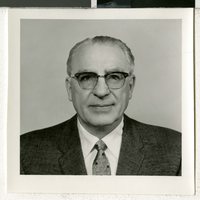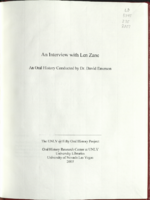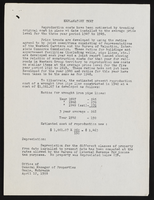Search the Special Collections and Archives Portal
Search Results

R.M.S. Oregon steamship, menu, August 4
Date
Archival Collection
Description
Note: No year on menu. Illustration on front cover has title: "Lake George, New York State." Restaurant: R.M.S. Oregon steamer Location: England
Text

Photograph of Cyril Wengert, circa 1944
Date
Archival Collection
Description
Image

Transcript of interview with Dr. Ed Goldman by Barbara Tabach, March 22, 2016 and April 4, 2016
Date
Archival Collection
Description
In this interview, Goldman discusses the impact of strategies for addressing segregation in schools, including desegregation lawsuits, as well as anti-Semitism within the district. He also talks about his push, as region superintendent, for K through 8th grade configurations in schools as well as his opening of West Preparatory Institute, a K-12 school in Westside. Goldman discusses the politics of school naming and goes through the various community members who have schools named after them. In addition, he reflects upon how his job as a Clark County School District central office administrator has morphed over the years, and the different issues that demand his time over the years.
Edward ?Ed? Goldman was born in Rochester, New York in 1951, and spent his childhood in Jerusalem, Israel as well as Cincinnati, Ohio. He received his first bachelor?s degree in political science from Columbia University and a second in Jewish Studies from the University of Judaism. Goldman later received a master?s degree in political science from California State University, and then a doctorate in education and higher administration from UNLV, focusing on educational law. Goldman first moved to Las Vegas while on a leave of absence from his job in Los Angeles to finish his Ph.D. dissertation, working as a math teacher for the Clark County School District. However, it was not until 1981 that Goldman took a full-time position with the district, and moved with his wife, Susan, to the city. After the move, his first job was at Von Tobel Junior High School. Three years later he served as dean at Woodbury Junior High School. From 1989 until 2000, Goldman led recruitment for the school district, and subsequently, he became the Southeast Regent Superintendent. He then was asked to create a new division, Educational Services, which he oversaw for five years. He then took a break from central office administration, returning to the school environment, until he was asked to come back to his previous job as Associate Superintendent for Employee Management Relations.
Text

Transcript of interview with Len Zane by Dr. David Emerson, May 10, 2007
Date
Archival Collection
Description
Text


Pack mule in the snow: postcard
Date
Archival Collection
Description
Image

Transcript of interview with Lawrence Canarelli by Claytee White, May 1, 2016
Date
Archival Collection
Description
“At five years old, I was the youngest boy at the orphanage. This was the first time that I had lived with indoor plumbing and indoor showers.” To describe award-winning home builder Larry Canarelli as a self-made man is to grossly understate his accomplishments and his determination. Canarelli, founder of American West, Nevada’s largest privately owned development company, learned all about living without shelter as a very young boy. When he was nine years old, Canarelli, the second of his mother’s six children, encouraged his veteran stepfather to buy the family’s first permanent house for $80 down and an agreement to assume payments on the Veterans Administration loan. As his school peers dreamt of large, shiny cars, Canarelli envisaged big, beautiful houses. After self-funding his education, graduating from the University of California Los Angeles, completing two years of U.S. Army service, and earning his Master’s degree from University of Southern California, Canarelli began his career working with a large home building firm in the Los Angeles area. Three years later he switched firms, and the new company sent him to Las Vegas. In this interview, Canarelli reaches back to his childhood to explain his motivation to build houses: “All of my life, I had an interest in housing. Perhaps this is because of never having a house when I was younger.” He recalls how the Collins Brothers helped him when he founded American West. He describes the Southern Nevada “shelter market” of the 1970s and follows its evolution in style and marketing through the 1980s and 1990s; he talks about master planning and the builders who first master planned their Clark County developments: Pardee Homes in Spring Valley, American Nevada in Green Valley, and Howard Hughes Corporation in Summerlin. He speaks to the influences of interest rates and available land on housing prices; the importance of environmentally responsible housing; where the entry-level housing market will go, and ways that technology has changed home building and home buying. And throughout, he exemplifies his devotion to, knowledge of, and respect for Southern Nevada’s housing industry-its builders, its market, and its buyers.
Text



